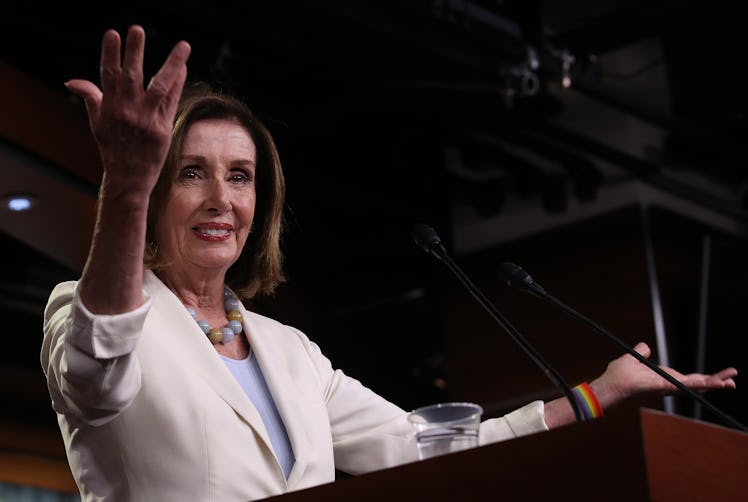
The House Voted To Raise The Minimum Wage In A Key Move For Democrats
As many of the Democratic presidential candidates rally around increasing the federal minimum wage, some politicians are taking a step in that direction, as the House passed a $15 minimum wage bill on Thursday, July 18. The bill would raise the minimum wage to $15 by 2025, The New York Times reported, and represents the Democratic Party's recent support of the years-long Fight for $15 movement. It's also a major move for Democrats looking to show off what the party may be able to accomplish moving forward.
According to The Hill, the federal minimum wage has not been increased since 2009, when it was raised to $7.25 per hour. The House's latest bill would therefore more than double the current minimum wage. However, it's unlikely to go anywhere in the Republican-led Senate, which is not expected to take up or pass this bill, The Hill reported. Nonetheless, many Democrats who are running for president in 2020 — including Vermont Sen. Bernie Sanders, who has drawn attention to this issue for years — have made a living wage central to their campaign platforms.
In recent years, cities like Seattle and San Francisco have implemented their own minimum wage increases, Reuters reported, but the latest House bill is a key move for Democrats seeking to take the Fight for $15 to the national level. According to Reuters, the House passed the Raise the Wage Act on Thursday with 231 votes in favor and 199 against. Six Democrats voted against the bill, per Reuters, while three Republicans voted for it.
The Raise the Wage Act was introduced in the House earlier this year by Virginia Rep. Bobby Scott, who described the bill as a "stimulus for Main Street America." However, Senate Majority Leader Mitch McConnell has voiced his opposition to the $15 minimum wage bill, telling Fox Business Network on July 18 that the legislation would "depress the economy at a time of economic boom."
“We don’t need to lose jobs, we don’t have enough jobs now,” McConnell said. "We’re not going to be doing that in the Senate.”
House Minority Whip Steve Scalise, meanwhile, has claimed that the bill would “eviscerate millions of American jobs,” NBC News reported. Republicans' refusal to take up the Raise the Wage Act in the Senate makes its passage largely symbolic. However, Democrats seeking to make this issue a key part of their national platform are nonetheless celebrating the bill's passage as a victory — particularly for workers and grassroots organizers who have fought to make a $15 minimum wage a reality.
“This is a historic day,” House Speaker Nancy Pelosi told reporters at a press conference. “No one can live in dignity with a $7.25 an hour wage. Can you?"
“This is about workers, it's about their economic and financial security, and today is a bright day because it affects so many people in our country," Pelosi added, per NBC News.
Pelosi and her fellow Democrats argued that the Raise the Wage Act would give up to 33 million Americans a raise by 2025, and that more than a million Americans would no longer be living in poverty. As of 2015, some 42% of American workers were making less than $15 an hour, according to a study from labor advocacy group the National Employment Law Project. Some 1.7 million American workers were making the federal minimum wage or less, per 2018 numbers from the U.S. Bureau of Labor Statistics. A February 2019 report from liberal-leaning think tank the Economic Policy Institute found that raising the minimum wage to $15 an hour by 2024 would directly benefit more than 28 million workers, with another 11.6 million benefitting from a "spillover" effect as employers sought to attract or retain employees by raising wages.
In 2012, hundreds of fast food workers walked out of their jobs to demand a $15 minimum wage in New York City, and the protests snowballed into a national movement. In the years since then, workers across the country have called for living wages and greater union rights — and the Raise the Wage Act is Democrats' attempt to take a step toward making that possible.
Where it goes once it hits the Senate? That will be up to legislators.